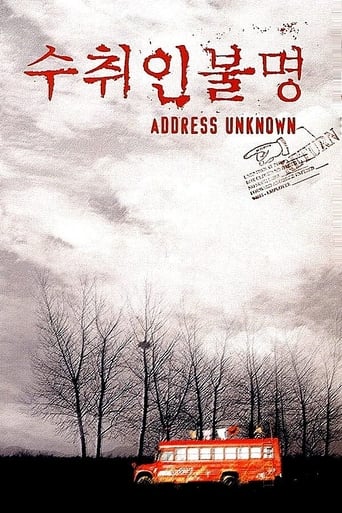Baseshment
I like movies that are aware of what they are selling... without [any] greater aspirations than to make people laugh and that's it.
SparkMore
n my opinion it was a great movie with some interesting elements, even though having some plot holes and the ending probably was just too messy and crammed together, but still fun to watch and not your casual movie that is similar to all other ones.
Kinley
This movie feels like it was made purely to piss off people who want good shows
ebossert
Disclaimer: I'm a fan of Kim Ki-duk. I liked 3-Iron, Time, The Bow, The Isle, and Spring Summer Fall Winter Spring. The Coast Guard was just okay, but I thought Bad Guy was vile and repulsive. That said, this film is hands down Kim's worst.Kim Ki-duk directs this dreadful drama which showcases a bunch of grumpy people acting stupid amidst a lunatic squad of American soldiers. The sheer artificiality of each scene in this 117-minute debacle is unparalleled by any other work I can remember experiencing. Almost every line of dialogue and every character action is handled with a silliness that needs to be seen to be believed. Thus, a large percentage of events come off as unintentionally comical. I now cite the following evidence: (1) A dude gets depressed, then kills himself by riding a scooter off of a very, very small hill, thus burying half his body in mud.(2) A group of poorly acted Americans curse angrily at each other during a pick-up basketball game. The viewer will note that the tussle begins for no apparent reason. The soldiers then overreact in the most artificial ways imaginable. In addition, the most "insightful" dialogue is nothing more than an endless series of 4-letter words.(3) The most outrageous C-rate American actor in the movie (and that's saying something!) contributes about half a dozen cameos of side-splitting idiocy throughout the film, providing the only true entertainment. The actor's name is Mitch Malum – and yes, even his name is funny. In one awful cinematic moment, Mitch slaps his Korean girlfriend in an effort to show her how he feels, then randomly confesses that he takes LSD to get away from the mountains of Korea. Unfortunately, the real reason he slapped her was because she wouldn't take a hit of LSD. So the question remains: how did he make the jump from LSD to mountains to romantic feelings? It makes no logical sense whatsoever.(4) Later on Mitch Malum (I love saying that) scares off a Korean kid, only to then mistakenly hit his head on a doorframe. Kim Ki-duk apparently didn't feel like shooting a re-take of that scene; and with good ole Mitch at the helm, could you really blame him? (5) Afterward, Mitch is training with his comrades and randomly decides to quit in the middle of a training sequence. His remarkable insightfulness contributes lines of incoherent nothingness. Picturing Mitch acting hysterically with a crooked helmet on his head just gets me.(6) Eventually, Mitch's bad temper provokes an arrow shot to his groin! His response to this (after a brief uncomfortable grunt) is to shoot his pistol in the air a few times, walk into the middle of the street, wait for a group of Korean cops and citizens to walk up to him, shoot the remaining bullets of his gun into the air, limp gingerly into the field, kneel down, act hysterically, then attempt to shoot himself with the very pistol HE JUST EMPTIED! (I literally had to stop the film for 15 minutes as I gasped for air in gut-wrenching laughter.) Now add a handful of other inadvertently humorous moments to the ones above, as well as the following stupid moments: (1) Dogs are beaten and killed constantly throughout the film (not for real, thankfully).(2) A highschool girl gets a cute little puppy, slips into a nightgown and forces it to "eat out" between her legs! Like I mentioned earlier, I like Kim Ki-duk, but he should be humiliated to be associated with such a horrible film like Address Unknown. This is truly a pathetic display of film-making that earns a special place as one of the most unintentionally riotous endeavors in motion picture history.One other reviewer's comment is entitled "Not one to watch if you want cheering up." I couldn't disagree more vehemently. This was the funniest film I've seen in years. Highly recommended as comedy. Stay far away if you're looking for drama though.
Michael Cumming
Not unlike the Oscar Wilde play from which my "One Line Summary" for this comment is co-opted the director of `Address Unknown' requires his audience to think. In all of the Kim Ki-duk films I have seen (The Isle, Address Unknown, Bad Guy) what lies on the surface differs greatly from what lies beneath it. He is working in a language of metaphor and allegory with characters that range from caricature to archetype to fodder. By fodder I mean they are impenetrable and near impossible to empathize/sympathize with for the sole reason that emotional attachment is not the director's intention. He is creating a fictional world made to comment on the world we live in.By exploring the eclectic residents of an isolated South Korean village in close proximity to an American military base Ki-duk is dealing with a number of issues such as globalization (the base, the bullies who moved to America), language (the theme of English, the comic interlude of the Playboy translation), gender (obvious), race (obvious), history (that family whose father turned out to be a traitor, the constant references to the past from the veterans), tradition (the archery), relationships (Korean girl and U.S. solider), war (obvious) and violence (obvious). The bleak, violent, at times repulsive world the film takes place in is so over-the-top that the audience can't help but think that it is just a means to an end.In films like `The Isle' and `The Bad Guy' the black humour and sarcasm are more evident. `Address Unknown' is a tad more subtle but there are more than enough hints to indicate the film should not be taken at face value. An excellent example is the constant, almost laughable violence.Kim Ki-duk is one of a handful of directors striving to create intelligent cinema that is accessible as well. The East is bursting at the seams with talent and I really hope it starts to get the recognition it deserves.
Simon Booth
Call me strange, but Kim Ki-Duk's THE ISLE is one of my favourite Korean movies. Not just the beautiful imagery, not just those scenes that had people fainting in the theatres, but because I empathised a lot with the characters, and the symbolism of their environment and their actions was very much in tune with my sensibilities. OK, so I'm strange .
Much as I enjoyed watching it, I won't try and argue that watching THE ISLE is a 'pleasant' experience - not one to leave you with a smile, so I was prepared for something a little bit serious and grim with ADDRESS UNKNOWN.
It is not a little bit serious and grim at all... it is *completely* serious and amazingly grim.Kim Ki-Duk is less interested in exploring the somewhat global issues of human feelings here, but instead wants to explore the feelings of a nation - Korea, still living in the shadow of the Korean war. The characters here come across as a little apersonal (it's ok, I just invented it) because they are embodiments of the country's experience... the division, the loss of autonomy, the dehumanisation that people feel, caught up in the conflicts between North and South and between Capitalism and Communism. Obviously to suggest that this was a universal Korean experience would be unreasonable, though Kim Ki-Duk is not interested in exploring balancing factors in this particular movie. People suffer. And suffer. And suffer. And then they suffer for a while. He is relentless in his examination of the pain that he clearly feels, for himself and for his country.It must be said that I know almost nothing about Korean history (though I am learning a lot as I type!), or of contemporary Korean society, so I don't know how common the feelings that Kim Ki Duk expresses here are, or how realistic his assessment of Korea's post war condition is. It all feels very believable, very convincing... but certainly none of the Korean people I have met are quite as utterly miserable as they must be if ADDRESS UNKNOWN were an accurate depiction of their lives.I think there is no doubt that for at least some people, and some communities, the feelings that Kim Ki Duk brings to the fore in the movie represent real feelings and real situations. But I think that it must be assumed that it is not an even-handed assessment of the situation, that he was quite certain what he wanted to say and permitted no deviation from it. In a way this is the movie's undoing... it is so relentless in its pursuit that it becomes too easy to get detached from it, to treat it as political allegory rather than a tale of human hardship. A little more warmth, a little bit of humour, maybe just one or two moments where at least one character was *slightly* happy... and I would have been much more able to bond with them, and their tragedies and miseries would have been that much more poignant as a result.A fairly small matter, and to a degree this observation may simply be an observation that I am not Korean. The movie is a very personal look at the feelings and circumstances of a nation, and having had no comparable experience myself, it is obvious that I'm going to struggle to fully relate.
If I couldn't empathise with the characters though, I could at least sympathise with them. The characters themselves were good characters, and the performances were mostly very good. Notable exceptions are the American soldiers in the movie, whose English dialogue and delivery is really quite embarrassingly bad The movie is very light on dialogue - little that is important is expressed through words, because it doesn't need to be. Always a good thing in a movie.It is the younger characters of the movie that are centre stage, those who were born years after the Korean war ended, but are still suffering its consequences. It's always refreshing to see young actors deliver mature performances, and this is one such example.THE ISLE probably impacted me mostly because of the visuals - the beautifully photographed and haunting environment in which the movie took place. ADDRESS UNKNOWN is not nearly as pretty, which can partly be based on location, but also the fact that the style is a lot more realistic, gritty even, as opposed to THE ISLE's abstractness. It is still well filmed though.
I wrote of THE ISLE after seeing it:"if you want to take away the beauty of his film, you have to be willing to pay the price of the horror"ADDRESS UNKNOWN is a less successful movie for me because once you get past it's horror, instead of beauty you find there's just a bit more horror . OK, it's not as bad as that... but the tone is quite unremittingly bleak. I don't know whether to recommend the movie or not. I liked it, but I'm not sure how many others will. Definitely not a movie to put on to take your mind off a troublesome day anyway!
Mac-148
There's a scene in this film where a man plays with a puppy. When the puppy, wagging its tail, approaches, the man, at first affectionate, slaps its nose. Two or three times. It is the most heartless moment in a cruel and vacuous movie. The cruelty is everywhere and stops the audience caring about anyone or anything. Except the dogs. Couple of questions. How does a bullet in the eye get fixed with what looks like soy sauce? Since when did a traditional Korean family allow a teenage daughter to bonk her U.S. soldier boyfriend in the family home? And where did the director drag up those American actors? Friday night in Itaewon? Boy oh boy they were bad. The boyfriend was bad, out of control and saying truly scary things. He blamed it all on the Korean mountains that were closing in on him. Hello? Calling Planet Earth? On top of that, in a movie set in the 1970s, no period pop music. Unforgivable. A real dog.





